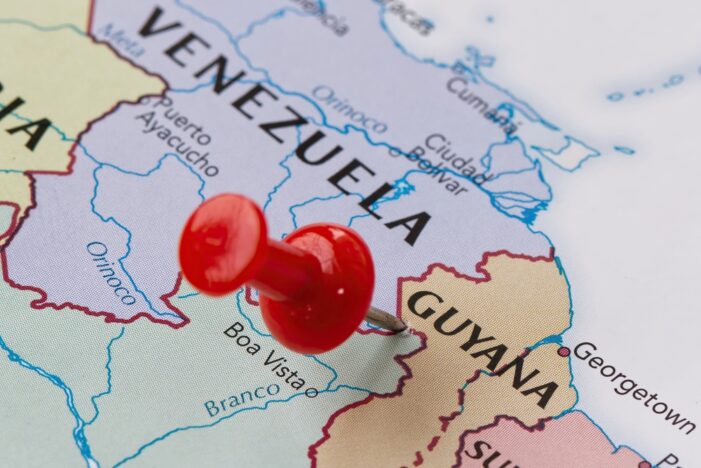Editorial credit: Below the Sky / Shutterstock.com
By Linda Nwoke, CAW Exclusive
Guyana and Venezuela are two fascinating South American nations offering unique experiences for travelers and residents alike. From the captivating landscapes and diverse cultures to the rich history and vibrant traditions, these two countries promise an unforgettable adventure.
However, despite sharing many similarities, both nations differ in size, population, economic development, cultural influences, and political situations. Sadly, the Essequibo dispute has remained a source of tension between the two countries.
During the weekend of December 3, 2023, Venezuelans voted in a non-binding referendum, expressing their desire to establish a new state in the disputed Essequibo area. The international community considers the referendum controversial, as it was deemed an attempt by Venezuela to claim sovereignty over the disputed Essequibo region. A location that is rich in resources and contested by neighboring Guyana.
History of the Dispute
The historical territorial dispute, dating back to the 19th century, is a complex issue with roots in colonial claims, shifting borders, contested arbitration, and recent discoveries of natural resources. The Essequibo region covers approximately two-thirds of Guyana’s territory, yet both countries claim historical and legal rights to the territory.
From the side of the Venezuelan government, under President Nicolás Maduro, he initiated a ‘consultative’ referendum to address five questions related to Essequibo; he aimed at gathering public support for:
- Reaffirming Venezuela’s historical claim to the Essequibo region.
- Rejecting the International Court of Justice’s (ICJ) jurisdiction in the territorial dispute.
- Creating a new state in the disputed territory.
- Demanding the return of all Guyanese territory “occupied” by Venezuela.
- Empowering the government to take all necessary action to defend Venezuela’s sovereignty over Essequibo.
At the end of the activity, the Venezuelan government reported overwhelming support, with over 10.5 million votes in favor. However, international observers have expressed concerns about the vote’s legitimacy, citing low turnout, limited opposition participation, and potential government manipulation.
On the other hand, Guyana condemned the referendum, judging it as a breach of the ICJ’s authority and an attempt to annex Guyanese territory. Previously, the ICJ had instructed Venezuela to refrain from actions that affect Guyana’s control over Essequibo during the ongoing legal proceedings.
Guyana’s Response
In reaction to the situation, the President of Guyana, Dr. Muhammad Irfan Ali, spoke exclusively to BBC News, emphasizing his country’s commitment to international law, dignity, and regional peace. His reaction to the Venezuelan referendum reflects Guyana’s firm stance on the Essequibo dispute. He is determined to defend the country’s sovereignty and territorial integrity while seeking a peaceful resolution through legal channels and international support.
“Well, first of all, our response has always been one that respects international law, one that respects the dignity of people, and one that leads to peace within this region,” says President Ali.
His reaction is classified as a denouncement of the referendum, which he describes as “a violation of international law” and “a desperate attempt by Venezuela to annex Guyanese territory.” He emphasized that a referendum cannot settle the referendum” and has no bearing on the ongoing International Court of Justice (ICJ) case regarding the dispute.
Also Read: President Ali’s interview with BBC News on the Guyana Venezuela Border Controversy
He explained that Guyana’s approach to the situation is rooted in seeking provisional measures from the ICJ, not to impede Venezuela’s right to hold a referendum but to prevent any actions that could lead to the annexation of Essequibo or the establishment of a new state.
“That is why we went to the ICJ for provisional measures about this referendum—not to stop the referendum because that is their business, but to have provisional measures against two questions, one that would allow Venezuela to annex the Essequibo and two to allow them to establish a state,” said Guyana’s President.
He underscored the importance of the ICJ’s clear directive that Venezuela must respect the existing status quo and bolster the gravity of the situation.
“And on both of these questions, the ICJ made it very clear that Venezuela is not to act upon the outcome of these two questions or the outcome of the referendum and that Venezuela must respect the status quo as it exists in Guyana. And that is Essequibo, belonging to Guyana, administering this country,” he explained.
He rejected Venezuelan legal claims concerning the 1899 Arbitral Award, which settled the border dispute in Guyana’s favor, and the ICJ’s jurisdiction over the current case. According to President Ali, the historical significance of the 1899 award serves as a boundary settlement mutually agreed upon by both Venezuela and Guyana. He pointed out Venezuela’s prior acknowledgment of these boundaries, even integrating them into their legal system and commemorating the agreement with postage stamps.
The concern is whether Venezuela will adhere to the ICJ’s order or choose a more aggressive path. The internal challenges within Venezuela compound the situation. Governance issues, threats to democracy, and a disregard for the rule of law have created a volatile environment.
President Ali expressed genuine concern that any reckless actions taken by Venezuela could exacerbate the suffering of its people, intensify regional pressures, and lead to an influx of migrants.
The president said, “I’m concerned Venezuela can follow their rhetoric and narrative. They can act recklessly. And this is concerning because already we have a dangerous situation in Venezuela where the people are suffering due to the type of governance, “he explained.
Based on this concern, the president confirmed that his country is taking a progressive approach. “So, as a country, we are not taking this for granted. We’re not taking the narrative of Venezuela for granted. That is why we have been working with our neighbors, our friends, Caricom, the Commonwealth, and the OAS, who have all issued powerful statements and called on Venezuela to respect the rule of law and order of the ICJ,” he confirmed.
Reaction of the International Community
The international community, including the United States and the European Union, has called for a peaceful and legal resolution. Yet, the outcome’s uncertainty and the ongoing legal debates surrounding the referendum raise concerns about regional stability and the potential for increased tensions between Venezuela and Guyana.
As the Essequibo dispute continues, it poses a looming threat to relations between the two nations, possibly destabilizing the entire region. Yet, despite the non-binding nature of the referendum and reports of low voter turnout, Venezuelan President Nicolas Maduro labeled it a pivotal step in reclaiming what he believes rightfully belongs to his country.
However, the International Court of Justice (ICJ) has intervened, ordering Venezuela to refrain from taking any actions that could alter the current situation, setting the stage for a potential diplomatic showdown.
Final Words
As tensions escalate, Guyana has not taken a passive stance. The country has actively engaged with its neighbors and international partners. Statements from regional entities such as the Organization of American States (OAS), Caribbean Community, and Commonwealth reflect a unified call for Venezuela to respect the rule of law and adhere to the ICJ’s order.
The international community closely monitors this unfolding situation, recognizing the potential for further destabilization in an already troubled region. The testing of diplomatic channels raises hopes for a peaceful resolution. Yet, the uncertainty lingers, casting a shadow over the relationship between Guyana and Venezuela and raising questions about the future of the disputed Essequibo region.



